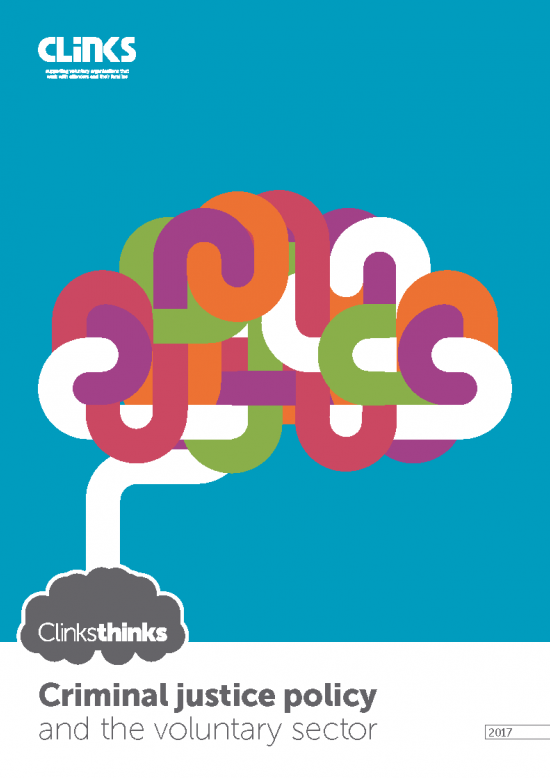
Clinks Thinks | criminal justice policy and the voluntary sector
This briefing sets out core principles and reccomendations that reflect the key policy issues raised by Clinks members, and the main issues on which Clinks advocates for change.
Clinks thinks all sectors working in criminal justice should:
VALUE THE VOLUNTARY SECTOR
Clinks thinks the voluntary sector’s role as a forward-thinking designer and provider of services needs to be recognised. Voluntary organisations should be pro-actively engaged as a valued partner by policy makers and service providers throughout the criminal justice system at a local, regional and national level.
STRENGTHEN THE SECTOR'S VOICE
Clinks thinks the voluntary sector’s role as a campaigner should be protected, allowing it to speak freely on behalf of service users and communities.
PUT PEOPLE AT THE HEART OF SERVICES
Clinks thinks the Government and local services should do more to put people in the criminal justice system at the heart of policy making and service delivery. Policy and practice should be person-centred, acknowledge that people need long-term support, and that relapse can sometimes be part of the journey to rehabilitation.
REDUCE THE PRISON POPULATION
Clinks thinks the Ministry of Justice should develop a clear strategy for reducing the number of people in prison by increasing investment in preventative services, diverting people away from the criminal justice system and expanding the use of alternatives to custody.
IMPLEMENT A DISTINCT APPROACH FOR WOMEN
Clinks thinks a cross-departmental strategy for women and girls, led by the Ministry of Justice, should ensure that women are diverted away from the criminal justice system at the earliest opportunity. To do this we need to increase the use of gender-specific community sentences and make sure we invest in specialist voluntary organisations including women’s centres.
TACKLE RACISM AND DISCRIMINATION
Clinks thinks all sectors working in criminal justice must work to tackle racism and discrimination by ensuring that they are using evidence and examples of good practice to meet the needs of BAME people. Government should have a comprehensive strategy which gives race equality a central place in all policy making and should have ambitious aims for reducing the inequality across the system.
PREVENT THE IMPRISONMENT OF CHILDREN
Clinks thinks the youth justice system needs to remain focussed on reducing the use of custody, increasing the use of early intervention and diversion, and provide a locally-owned and multi-agency approach to all services. A national strategy needs to be produced and published to both address the causes of over-representation of black, Asian and minority ethnic young people in the youth justice system, and address the reasons why reducing a youth custody approach has failed this group.
DELIVER A DISTINCT APPROACH FOR YOUNG ADULTS
Clinks thinks the Ministry of Justice should utilise the evidence gathered by the Transition to Adulthood Alliance to produce a national strategy for the management of young adults aged 18-25 at all stages of the criminal justice system (as recommended by the Justice Select Committee). This needs to deliver a distinct approach to young adults and design services which support desistance from crime, based on evidence and service user consultation.
INVOLVE PEOPLE WITH LIVED EXPERIENCE
Clinks thinks the Ministry of Justice, commissioners, and all service providers should embed the involvement of people with lived experience throughout the criminal justice system to inform policy and practice.
JOIN UP SERVICES TO RESPOND TO MULTIPLE NEEDS
Clinks thinks decision makers, commissioners and service providers should use learning from the Making Every Adult Matter coalition and the Big Lottery’s Fulfilling Lives programme to develop new policies and better coordinated services which support people with multiple needs.
SUPPORT HEALTHY RELATIONSHIPS
Clinks thinks thinks a clear government strategy is needed to advocate for consistent and specialist services which support positive social relationships for people in the criminal justice system in custody and post-release, and which support children’s wellbeing.
IMPROVE HEALTH AND WELLBEING
Clinks thinks commissioners and providers in the health and criminal justice systems should work together to prioritise improving health and wellbeing and continuity of care. This should include investment in prevention, early identification of people with health needs, diverting people into treatment where appropriate and ensuring continuity of care for people as they enter prison, move between different prisons, or on release back into the community.
CHAMPION VOLUNTEERING
Clinks thinks volunteering should be championed by the Ministry of Justice, courts, probation services and prisons. They should work with the voluntary sector to create a culture and operating environment which encourages and supports volunteers.
ENCOURAGE CREATIVITY AND INSPIRATION
Clinks thinks the Ministry of Justice, commissioners, and all service providers should ensure access to arts activities for people involved in the criminal justice system. To this end the Ministry of Justice and the Arts Council should develop a joint strategy to support the arts within criminal justice settings.